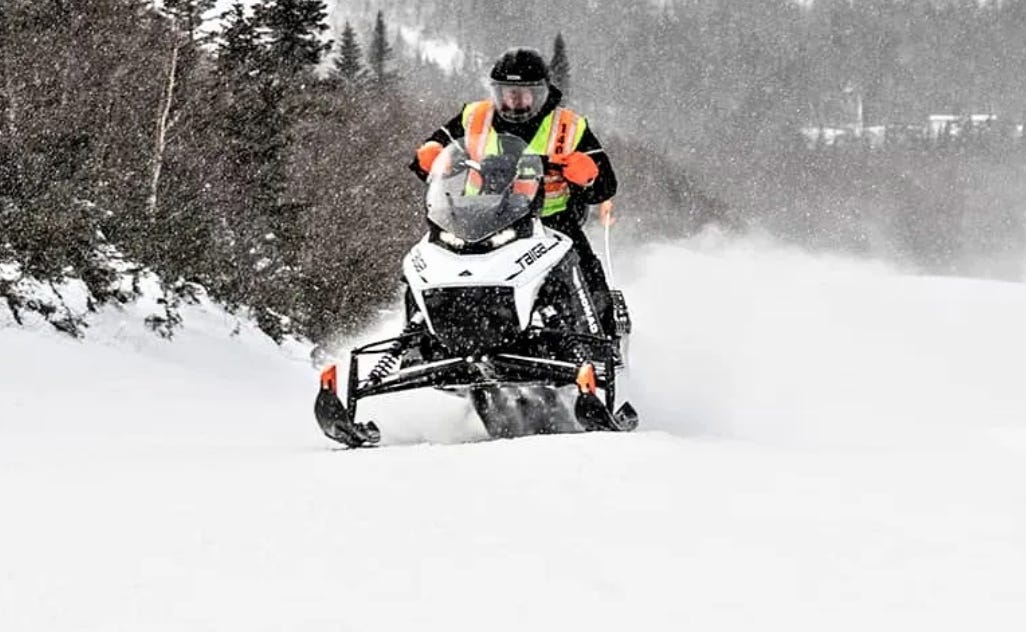A Quiet Revolution - Could a Global Partnership Puts Vermont's Snowmobile Trails on an Electric Roadmap?
The primary hurdle for any adoption of electric sleds is infrastructure. A rider’s "range anxiety" is amplified on a remote trail in the Northeast Kingdom, far from the nearest electrical outlets.
A recent strategic partnership between Canadian electric vehicle manufacturer Taiga Motors and global marine charging network Aqua superPower is poised to send ripples across the Green Mountains, potentially heralding the most significant change to Vermont’s snowmobiling culture in decades.
The collaboration, aimed at accelerating off-road electrification, explicitly puts snowmobile charging infrastructure "on the roadmap," raising a critical question for the state: Is Vermont, with its 5,000-mile trail network and deep-rooted sledding tradition, ready for a quieter, cleaner ride?
For generations, the roar of a two-stroke engine has been the soundtrack of winter in Vermont's forests and fields. Snowmobiling is not just a cherished pastime; it's a vital economic engine. A 2023 study from the University of Vermont found that the industry contributes an estimated $90 million in annual value to the state's economy, a figure that other reports suggest could be part of a wider impact reaching hundreds of millions.
The new partnership targets the heart of this tradition. Taiga produces electric snowmobiles like the Nomad, which are already in use by staff at Vermont’s own Stratton and Sugarbush resorts, owned by Alterra Mountain Company. These machines offer a starkly different experience: near-silent operation and zero tailpipe emissions.
Environmental advocates have long pointed to the ecological cost of conventional snowmobiling. According to studies cited by the National Park Service, older gasoline-powered snowmobiles can emit nearly as much air pollution in a single hour as a modern car does in an entire day. The noise pollution has also been shown to affect wildlife behavior and disrupt the tranquility of natural areas.
“Scalable infrastructure is key to unlocking the full potential of electrification,” said Sam Bruneau, Taiga’s Co-Founder & CEO, in the partnership announcement. The vision is to make it "easy for individuals and fleets to go electric."
This is where the challenges—and Vermont's unique opportunities—come into sharp focus. The primary hurdle for any widespread adoption of electric sleds is infrastructure. A rider’s "range anxiety" is amplified on a remote trail in the Northeast Kingdom, far from the nearest electrical outlet. For the vast network managed by the Vermont Association of Snow Travelers (VAST), which crisscrosses public and private land, the logistical challenge of installing and maintaining trailside charging stations appears immense.
Furthermore, Taiga's consumer sales and service network in Vermont is still in its infancy, presenting a practical barrier for individual riders who might consider making the switch.
However, a closer look at the state’s recent progress suggests Vermont is better positioned than any other state to meet this challenge.
According to data from Drive Electric Vermont, the state currently leads the nation in public electric vehicle charging stations per capita. The state government, along with local utilities, is aggressively funding the expansion of this network through initiatives like the "Charge Vermont" program, which is specifically aimed at building out infrastructure in rural communities, multi-unit dwellings, and workplaces.
While these chargers are designed for cars, they represent a powerful, existing backbone of electrical infrastructure in the very towns that serve as hubs for the VAST trail network—places like Stowe, Killington, and Island Pond. For a company like Aqua superPower, which specializes in deploying charging hardware, the task would not be starting from scratch, but rather extending an already robust and growing grid to key trailheads, lodges, and restaurants that cater to riders.
Karen Gill, COO of Aqua superPower, noted that by joining forces, the two companies are "accelerating both sides of the equation"—the vehicles and the infrastructure to power them.
For Vermont, the equation is clear. The partnership between Taiga and Aqua superPower presents a potential future where the state's vital winter tourism economy can align with its strong environmental identity. While the sight of a rider plugging in their sled next to a general store in West Burke may still be a few years away, the announcement signals that the technological and logistical groundwork is being laid. The ultimate question may not be if electric snowmobiles will arrive on Vermont's trails, but how soon the state can leverage its leadership in electric transportation to welcome them.


